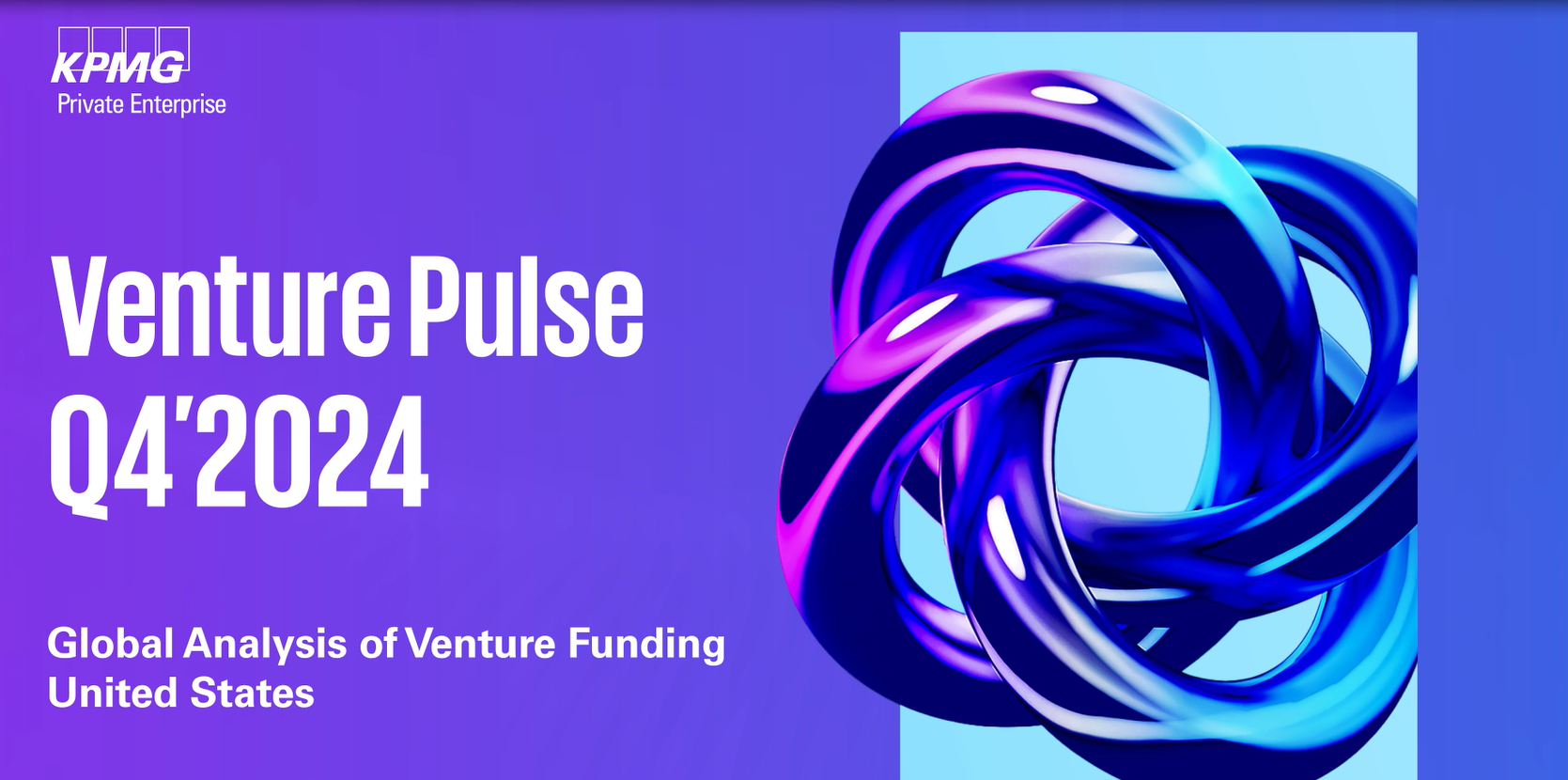Venture Pulse Q4 2024
The Venture Pulse report provides insights around trends, opportunities, and challenges in the U.S. venture capital market.

During Q4’24, the US saw total VC investment rise to its highest level since Q2’22 as interest and investment in AI continued to be red-hot. The sector accounted for more than half of the country’s top ten deals, including the first $10 billion venture round ever seen in the US.
Deal volume remains subdued in US despite major increase in deal value
Despite the significant uptick in deal value in the US, the total number of VC deals remained subdued during Q4’24. VC investors continued to focus on quality over quantity given the ongoing uncertainties in the market, including global conflicts and geopolitical tensions, the US presidential election which occurred mid-way through the quarter, and the ongoing lack of exits.
Largest crop of multi-billion VC funding rounds ever in the US
Q4’24 was a banner year for multi-billion dollar VC deals in the US. Five companies raised VC rounds at or above $4 billion, including Databricks ($10 billion), OpenAI ($6.6 billion), xAI ($6 billion), Waymo ($5.6 billion), and Anthropic ($4 billion). All five companies are major players in the AI space, with OpenAI, xAI and Anthropic focused primarily on generative AI and Waymo focused on using AI to enable autonomous driving capabilities.
The level of investment into AI continues to be massive. That’s not surprising. But I think people are now starting to become more discerning as to who the winners may be in the AI space — the companies with credible business models, creating highly disruptive solutions, as opposed to others who have put AI wrappers on existing solutions. The largest deals of this quarter underscore that — they’re the companies that people have been putting their bets on through all the AI-hype.
Conor Moore
Global Head, KPMG Private Enterprise
Well-established VC funds finding it easiest to raise funding
After dropping off considerably in 2023, fundraising by VC firms in the Americas remained steady year-over-year, driven primarily by fundraising activity in the US. Given the significant degree of macroeconomic uncertainty in the market, the high interest rate environment, and the lack of returned capital with which to invest, LPs have been very discerning about where to put their capital this year. First time general partners, micro funds, and investors without proven track records struggled to raise funds this year, even in the US. Well established VC funds with long track records had far less difficulty raising additional funds, although it has taken many longer to fully capitalize them. During Q4’24, for example, General Catalyst raised $8 billion for its XII Fund, which includes a number of initiatives and investments spanning a gamut from AI and defence to healthtech, climate and energy technologies, and fintech.1
Late stage deals on the rise, suggesting increasing confidence heading into 2025
In 2022 and 2023, a good number of late stage investments in the US were lifeline investments aimed at helping companies survive a period of significant uncertainty and the pushing out of the IPO market opening. In Q4’24, after a period of significant cost-cutting and looking for efficiencies, a number of later stage startups have turned their attention back to growth — raising fresh funding rounds to drive their short-term growth, improve their balance sheets, and position themselves for an IPO in 2025 or 2026.
Businesses evaluating opportunities and challenges related to incoming US administration
The completion of the US presidential election injected a view that the incoming administration will be more business friendly, although it also introduced a number of unknowns, including uncertainty as to what changes the incoming administration might make. The pending change is causing both VCs and investors to evaluate their operations and investments, in part to better understand potential opportunities and challenges that might arise over the coming term. The possibility of tariffs was one such concern, with many companies looking at how their manufacturing, global supply chain and global sales chains could be affected and whether they might need to reconsider their operations or — in the case of emerging tech companies — where to base certain activities, such as manufacturing facilities.
Successful post IPO performance of tech companies helping to fuel optimism for 2025
The combination of interest rate cuts, the easing of some uncertainty in the wake of the presidential election, the fact a number of tech companies have performed very well post-IPO in recent months — including Reddit, whose stock price rose 240 percent, and Rubrik and Astera Labs, whose stock prices have both climbed more than 100 percent — and even the excitement of VC investors for almost all things AI, has helped spark optimism for the IPO and M&A markets in the trailing months of 2024.2 A significant number of companies are ready to go once the IPO door swings fully open; the big question is more a matter of exactly when in 2025 that will happen.
CVC investment in US very resilient over 2024
Over the course of 2024, CVC investment in the US remained quite solid, particularly compared to CVC investment in other regions of the world. Interest in AI likely had a role to play in this resilience, with many large US corporates choosing to make sizable investments in innovative and agile AI model and infrastructure companies rather than seeking to drive AI innovation in-house.
Trends to watch for in Q1’25
Heading into Q1’25, VC market participants will be watching the exit market in the US, with growing expectations that IPO activity will pick up significantly. While a major rise in IPO exits right out the gate may not be in the cards given the uncertainty associated with the forthcoming administration changeover, Q1’25 could see IPO filings and related activity heating up as companies position themselves for exits in Q2’25 and Q3’25. M&A activity is also expected to pick up in Q1’25, particularly if the US Federal Reserve continues to make cuts to interest rates.
While AI is expected to remain the hottest ticket for VC investors in the US during Q1’25, a number of other sectors are also expected to see solid investment, including defense tech, cybersecurity and life sciences. Crypto could also see a resurgence in interest from VC investors given the change in administration.
Everything will likely change very quickly in 2025. There is potentially going to be changes to rules, regulations, legislation. We’re likely going to see businesses changing how they think about internal cost structures, how they deliver services, how they’re protecting their organizations from cybersecurity risks. We’re going to see a lot of investment in AI, in defense techs, in robotics. The attitude in the VC market heading into 2025 needs to be how can we adapt as quickly as possible to all the changes that are coming? because it looks to be a real year of transformation.
Francois Chadwick
Partner, KPMG Private Enterprise

Key insights from Venture Pulse Q4 2024
In the U.S. in Q4’24
1
2
3
4
5
Dive into our thinking:
Venture Pulse Q4 2024
Download PDFQ4’24 Venture Pulse Report – global trends
A global overview of key findings uncovered from the Q4’24 Venture Pulse Report.
LinkedIn Live Event
Hear KPMG Private Enterprise professionals discuss highlights from the latest Venture Pulse report.
About the Pulse Series

Explore more

KPMG Private Enterprise Tech Innovator in the US
Meet the next generation of tech innovators

Diving Deeper into AI: Exploring the Potential and Challenges
Views on being an AI startup in the current environment

Disruption Decoded Webcast: Perspectives from private and newly public companies
Disruption Decoded: Perspectives on Growth, AI, and Reporting from Private and Newly public Companies
Subscribe to KPMG Private insights
Subscribe to receive pertinent information that will help you drive value for your private company.
Meet our team
